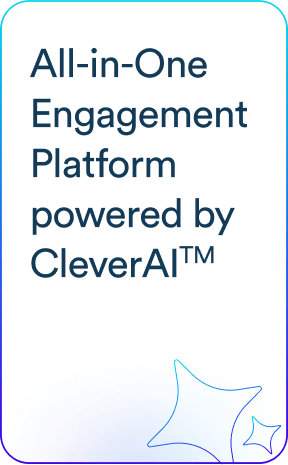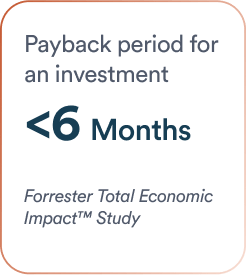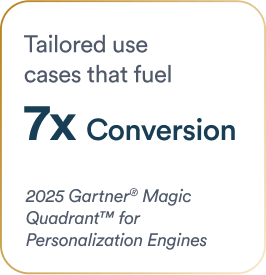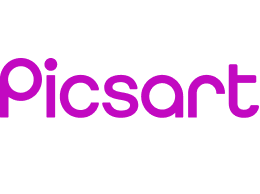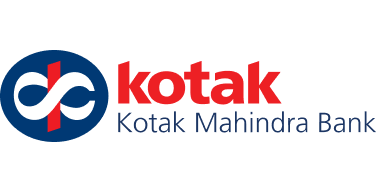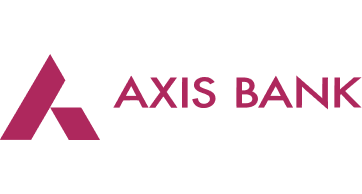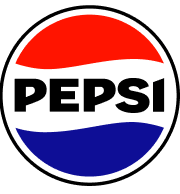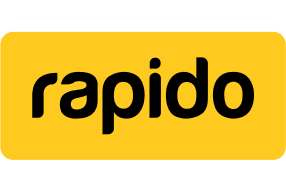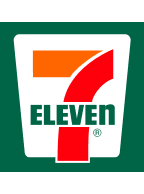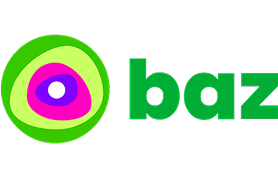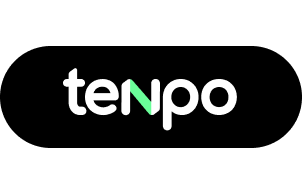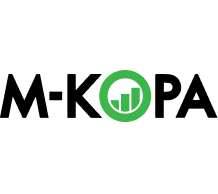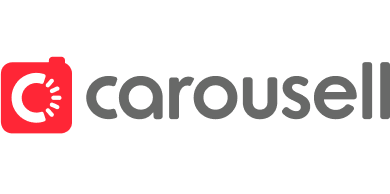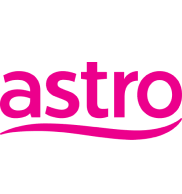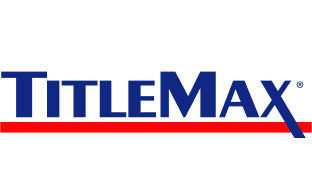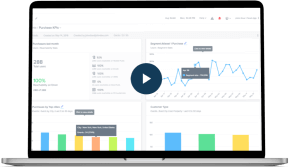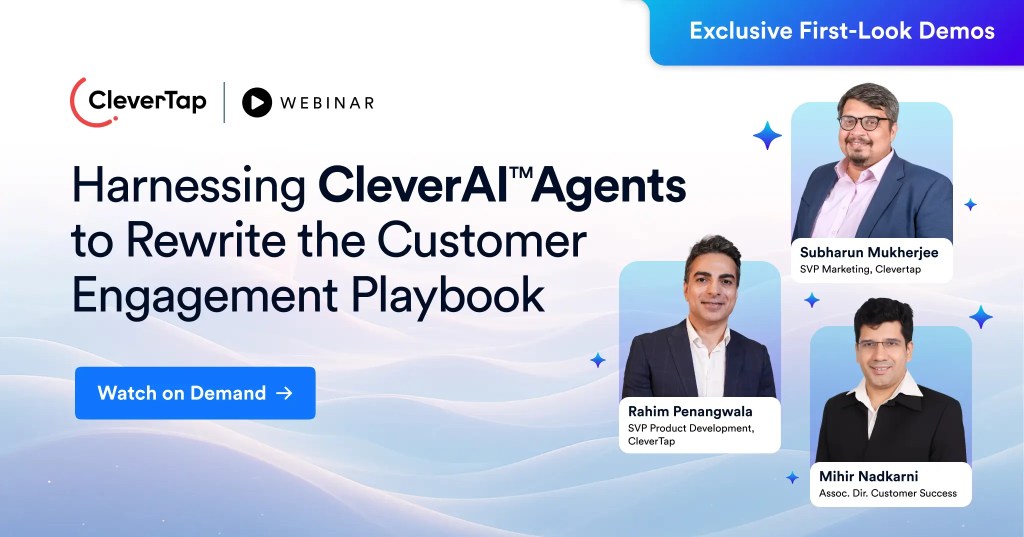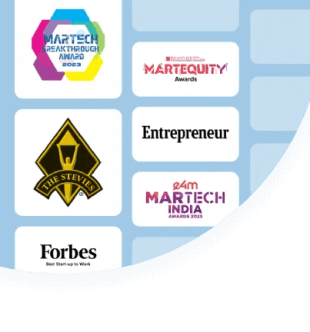Traditional automation has long supported marketers by handling repetitive tasks, but it stops at execution. Marketing AI agents, on the other hand, bring autonomous decision-making and real-time responsiveness into the mix.
Unlike traditional automation tools that follow predefined rules, intelligent agentic AI systems can reason, plan, and execute multi-step marketing tasks autonomously.
These marketing AI agents continuously learn from customer data and context, adapting in real time across channels to boost efficiency and personalization. Rather than functioning as simple bots, they act like proactive team members, learning from outcomes, adjusting strategies on the fly, and even optimizing themselves to deliver better results over time.
In this blog, we will define what marketing AI agents are, highlight key use cases and benefits, and demonstrate how modern customer engagement platforms, such as CleverTap, integrate these intelligent systems into the marketer’s toolkit.
What are Marketing AI Agents?
Marketing AI agents are autonomous systems that use artificial intelligence to achieve marketing goals, making decisions and taking actions, with minimal human intervention. You can think of them as an ultra-smart assistant that is trained on your data and objectives.
Traditional AI assistants like simple chatbots rely on pattern matching and scripted rules, making them reactive tools limited to single prompts or fixed workflows. AI agents, on the other hand, bring autonomy and adaptability; they can decompose a goal into subtasks, call APIs or databases to gather needed data, and carry out actions end-to-end.
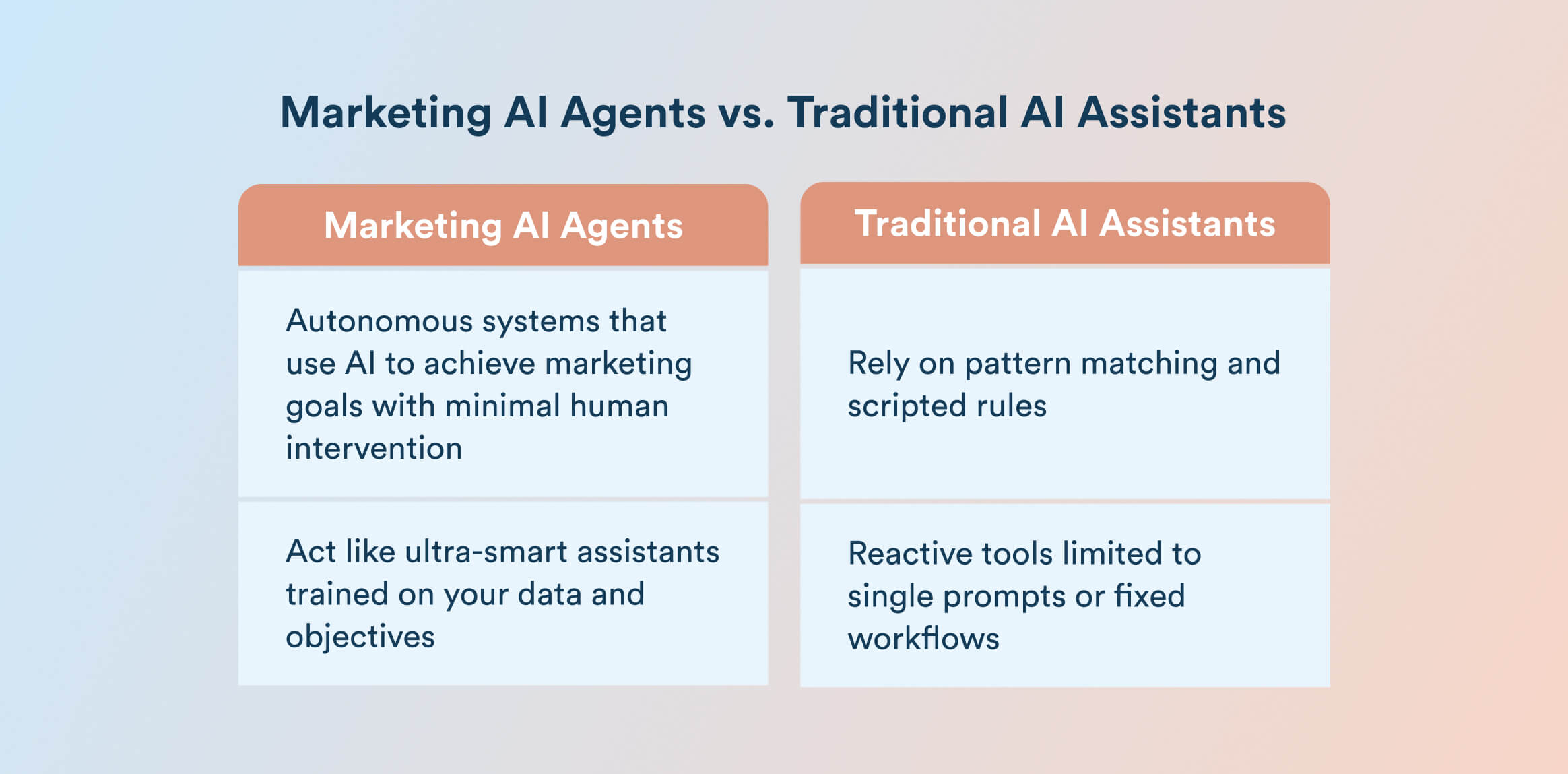
They operate on a spectrum. On one end are static bots bound by scripts, and at the other are full AI agents capable of independent reasoning, planning, and actioning.
These AI agents in marketing, like CleverAI, represent the next leap in technology. In previous generations, marketers stitched together point solutions via segmentation, email tools, and ad platforms, and waited for batch reports. Agentic AI can automatically orchestrate across all these systems.
For example, an agent can pull unified customer profiles from a CDP or CRM, apply analytics insights, and then send a personalized message or adjust an ad campaign, all without manual handoffs.
Benefits of Marketing AI Agents and Why Marketers Should Embrace It
AI agents in marketing are goal-based agents and can deliver advantages that traditional automation cannot match. Key benefits include:
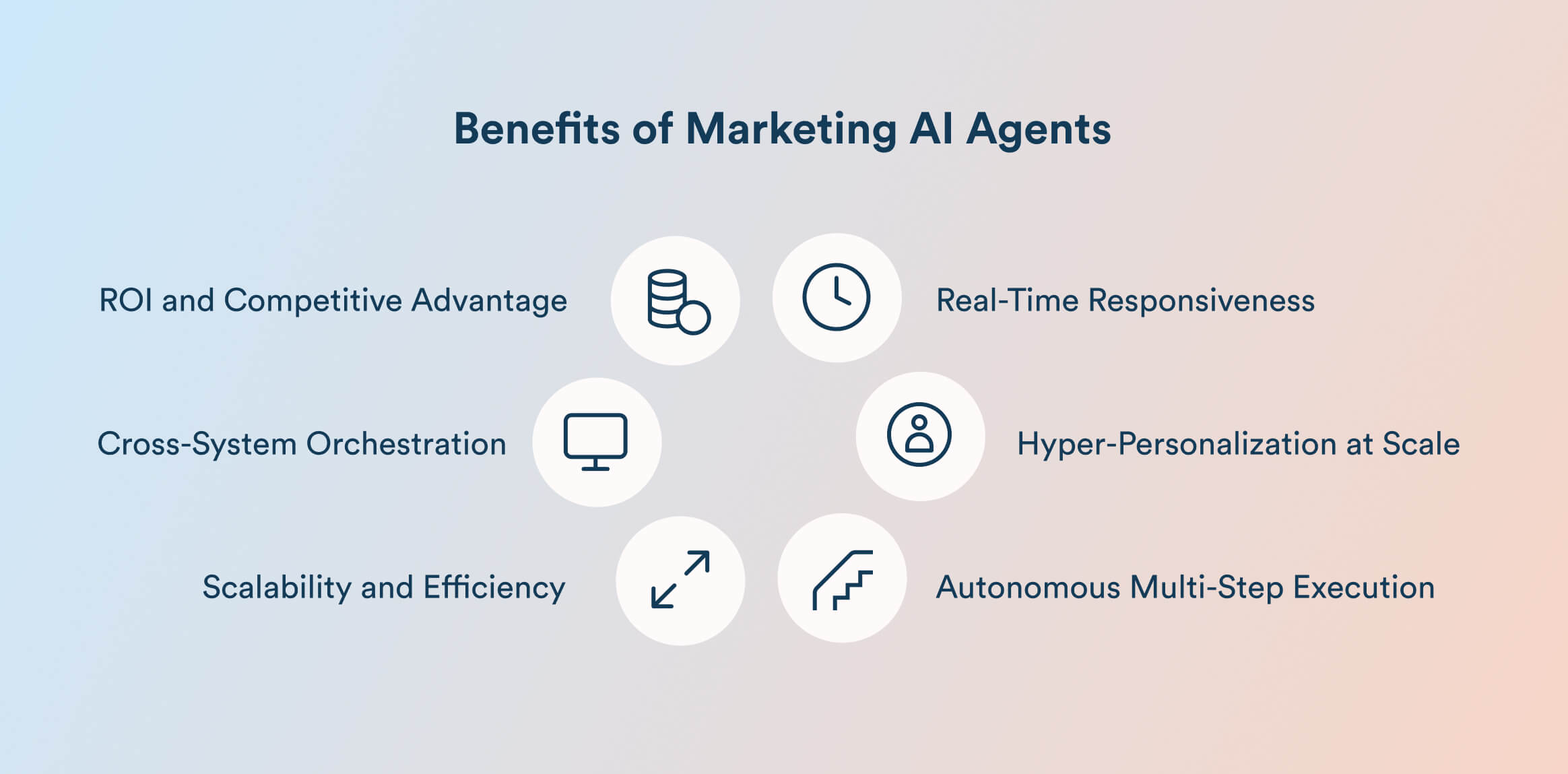
- Real-Time Responsiveness: Intelligent agents in marketing instantly react to customer signals such as a website visit or cart abandonment. Unlike human teams limited by schedules, they can trigger personalized actions 24/7.
- Autonomous Multi-Step Execution: From recognizing a high-value lead to enriching their profile, drafting personalized campaigns, and monitoring results, marketing AI agents execute workflows end-to-end without manual intervention. For example, CleverAI’s Strategy Agent sets goals, calls on Decision, Creative, and Action Agents, and self-learns to refine campaigns.
- Hyper-Personalization at Scale: AI agents in marketing tailor every interaction by analyzing customer data and behavior. Millions of users can each receive unique messaging, offers, and timing, lifting engagement rates dramatically compared to generic campaigns.
- Scalability and Efficiency: By automating routine tasks like list segmentation, bid adjustments, or reporting, agents reduce operational overhead. A recent IBM study found that 69% of leaders see better decision-making and 67% report cost savings from adopting AI agents.
- Cross-System Orchestration: Agents connect with CRM, CDP, analytics, and media platforms, coordinating email, SMS, push notifications, and ad campaigns into one seamless customer journey. For example, Via Ask.AI, marketers launched individualized customer paths with CleverAI’s Action Agent.
- ROI and Competitive Advantage: According to Gartner, by 2028, 33% of enterprise software applications will include agentic AI, and analysts project 15% of enterprise decisions will be fully autonomous by 2028. Early adopters are already reporting higher conversions and engagement once agents are tuned in.
What Are Marketers Saying?
Across the marketing industry, a common critique is gaining traction: Current AI assistants often fall short of practical, day-to-day needs. Industry chatter suggests that general-purpose tools like GPT-based chatbots can generate content but often falter on integrated marketing tasks or research.
Instead of achieving an automated workflow, teams find themselves issuing multiple prompts or cobbling together separate tools. In practical discussions, marketers are seeking an AI intern who can effectively manage end-to-end campaigns across channels, rather than just a chatbot that generates copy.
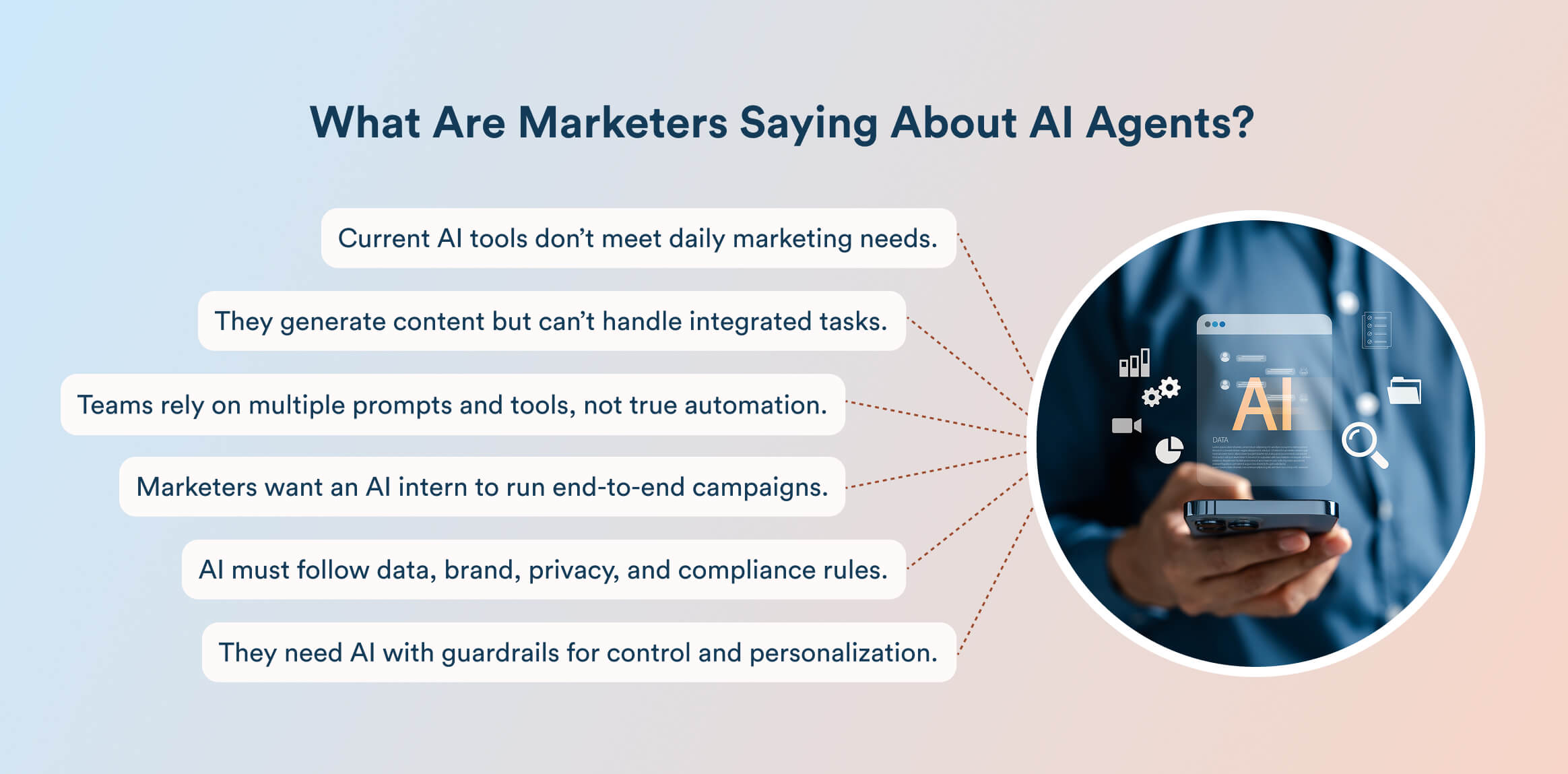
They emphasize that any AI agent must respect their existing data and rules. An agent should leverage CRM and CDP profiles, past purchase history, and real-time behavior, but it must also obey brand guidelines, privacy policies, and business constraints. Many caution that an AI that ignores compliance, for example, spamming customers or using off-brand language, would quickly lose trust.
The consensus is clear: marketing professionals want an AI system that operates within well-defined guardrails, giving marketers control while driving personalization and efficiency.
Unlike standalone chatbots, CleverAI plugs directly into your marketing stack, using your real-time customer data and your brand’s rules. It then autonomously plans and executes campaigns across channels. This decisioning engine embodies exactly what marketers are asking for: an agentic AI platform that can think, act, and deliver ROI on your behalf, while keeping you firmly in control of strategy and safeguards.
Core Use Cases of Marketing AI Agents Across Functions
Mentioned below are some core use cases of AI agents in marketing across various marketing functions.
1. Conversational Customer Engagement
Conversational AI agents go beyond rule-based bots, which follow rigid scripts, by understanding context, retaining memory, and adapting in real time. For example, an AI chat agent can answer a pricing question and instantly offer a discount or schedule a demo if it senses purchase intent.
These agents maintain seamless continuity across channels, from app to email or WhatsApp, without losing context. They also hand off complex issues to human support when needed. Operating 24/7 and scaling to thousands of users, conversational AI agents deliver personalized, intelligent engagement, capturing leads and driving outcomes that scripted bots often fail to achieve.
2. Hyper-Personalization
Marketing AI agents drive hyper-personalization by analyzing customer behavior and profiles to tailor every touchpoint. For instance, a user browsing premium headphones might receive an email promoting high-end models, while another who abandoned a mid-range pair gets a cart reminder.
At scale, agents segment customers into micro-groups, based on churn risk or purchase frequency, and deliver tailored incentives like loyalty boosts or VIP offers. They also generate creative content.
For example, CleverAI’s Creative Agents can produce personalized headlines and visuals for each segment. This one-to-one personalization, impossible to do manually, typically delivers an uplift in open rates, click-throughs, and conversions.
3. Dynamic Campaign Execution
AI agents in marketing revolutionize campaign execution by running objectives end-to-end without manual effort. They handle media buying, bid adjustments, budget reallocations, and even create new ad variations in real time.
Using closed-loop learning, agents can A/B test ads, detect winners, and automatically scale the best-performing creative. They operate across channels by testing email subject lines, optimizing social ads, or tuning search campaigns instantly as performance shifts. This results in autonomous, always-on campaign optimization that once required entire teams.
4. Strategic Intelligence and Insights
AI agents act as real-time intelligence partners, going beyond static reports to deliver actionable insights and even execute changes. For instance, if they detect a surge of negative feedback on social media, agents can alert the product team or instantly adjust campaign messaging.
By analyzing reviews and support tickets, they uncover trending feature requests and recommend targeted campaigns. These marketing AI agents transform raw data into prescriptive intelligence, highlighting successes, flagging weak spots, and suggesting next steps. Some even close the loop by launching follow-up campaigns for dissatisfied segments, enabling marketers to iterate strategies continuously instead of relying on delayed, quarterly reviews.
5. Workflow Automation and System Orchestration
Agentic AI in marketing streamlines workflows by handling repetitive tasks like data management, content assembly, and reporting. Instead of manually building a weekly performance deck, agents can compile metrics, flag key changes, and share updates with stakeholders. They also automate marketing tasks such as updating email lists or generating content briefs based on trends.
Agents integrate with CRM, CDP, CMS, and ad platforms, acting as the connective tissue across systems. For instance, they can trigger a win-back email after a subscription expiry or pull product catalogs to send personalized recommendations, ensuring seamless cross-platform orchestration and real-time responsiveness.
Learn more about the different types of AI agents in marketing.
Key Components and Governance Essentials for Using Marketing AI Agents
To unlock the full potential of agentic AI in marketing, teams need both the right building blocks and clear governance frameworks. Together, these ensure AI agents are powerful, reliable, and responsibly deployed.
Essential Building Blocks
Marketing AI agents are powered by a set of interconnected capabilities that allow them to sense, think, act, and improve continuously. These building blocks include:
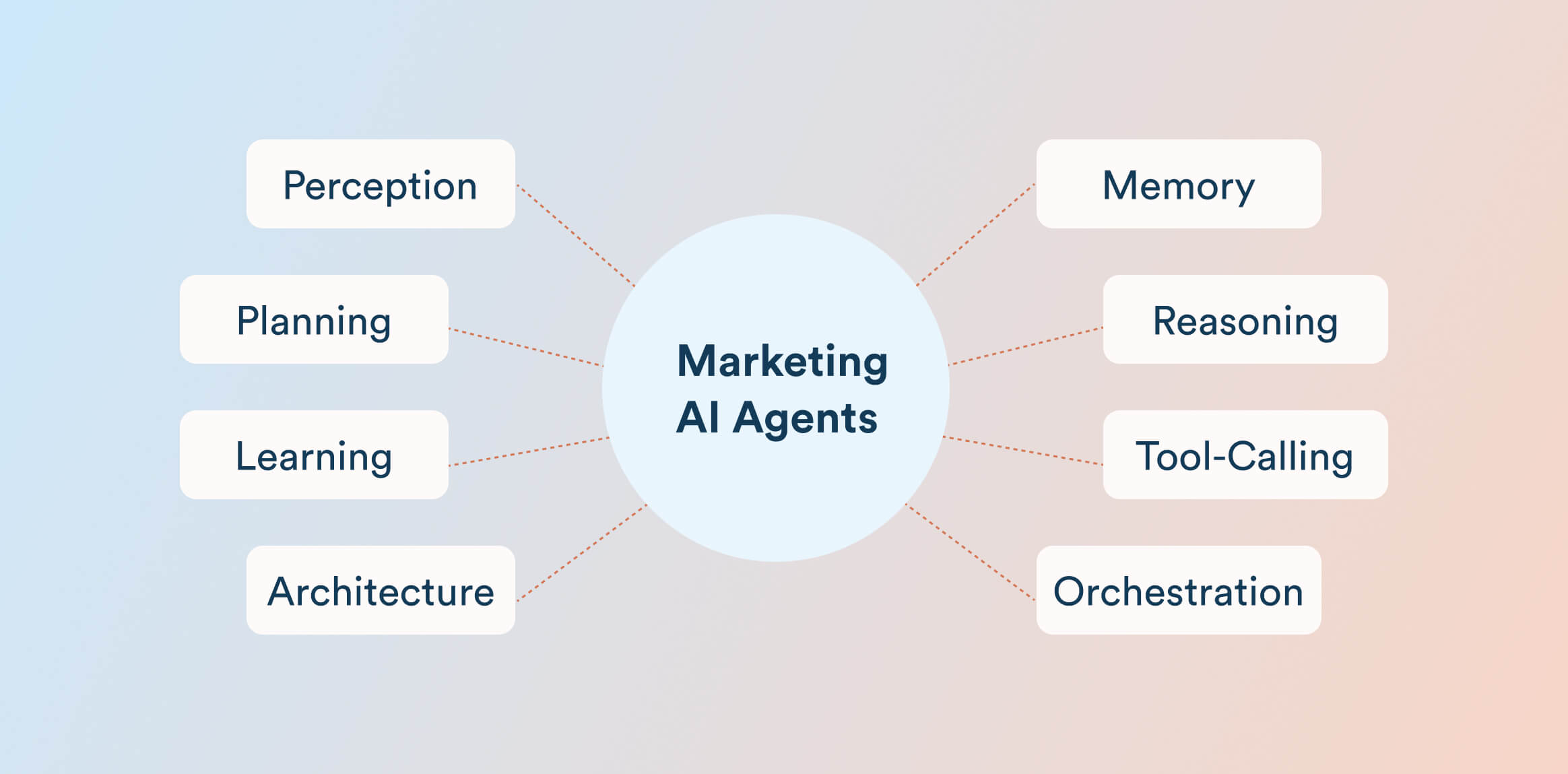
- Perception: Marketing AI agents rely on large language models (LLMs) and machine learning to process natural language, customer interactions, and data streams. This sense-making ability allows them to interpret campaign goals, audience queries, and performance metrics much like a human marketer would.
- Memory: Agents store past interactions, campaign outcomes, and customer data. It helps them avoid starting from scratch each time, enabling consistent personalization, recognition of customer preferences, and iterative improvement over time.
- Planning: Rather than reacting only to immediate inputs, AI agents can break down broad marketing goals into structured, actionable tasks. For example, “improve customer retention” becomes a stepwise plan of analyzing churn data, segmenting audiences, and creating targeted loyalty campaigns.
- Reasoning: AI agents reason about the best path forward to execute pre-set tasks. By continuously evaluating new data and outcomes, they adapt campaigns in real time to align with shifting market conditions or customer behaviors.
- Learning: With each interaction and campaign, agents learn from successes and failures. The self-improving feedback loop allows them to refine targeting strategies, messaging, and timing to maximize performance over the long term.
- Tool-Calling: When knowledge gaps arise, AI agents can call on external APIs, databases, or even other AI models. For instance, they might invoke a forecasting tool to predict demand spikes or a translation API to localize content at scale.
- Architecture: At the heart of an AI agent lies the LLM, functioning as its brain. But this brain is connected to data pipelines, APIs, and decision layers, creating a modular architecture that integrates perception, memory, reasoning, and tools into a cohesive system.
- Orchestration: The real power of AI agents comes from their ability to coordinate all these elements into a seamless workflow. This orchestration turns individual capabilities into an intelligent, end-to-end marketing assistant.
Governance Priorities
As marketing AI agents gain autonomy, governance becomes essential to ensure they operate responsibly and in alignment with brand values. Marketers should focus on:
- Ethical Risks: Define clear rules and boundaries to prevent harmful or unethical actions, such as offering discounts beyond approved limits or exploiting sensitive customer data.
- Bias Prevention: Continuously monitor outputs to ensure agents don’t inadvertently discriminate against customer groups or skew personalization in unfair ways.
- Transparency: Build audit trails and clear reporting so marketers can trace back how decisions were made, ensuring accountability and trust.
- Human Oversight: Keep people in the loop for high-stakes decisions. For example, agents may draft campaign strategies, but managers should approve before launch.
- AI Sandboxing: Test agents in controlled environments before full deployment. Sandboxing allows teams to detect errors, unintended behaviors, or compliance gaps early.
- Monitoring and Control: Implement real-time monitoring dashboards that track agent activity and flag anomalies or potential compliance breaches.
- Governance Toolkits: Use frameworks like CleverTap’s CleverAI that emphasize collaborative, controlled agent workflows, where marketers set escalation rules.
The marketer’s major role lies in shifting from micromanaging campaigns to defining objectives, boundaries, and evaluation criteria. This ensures AI agents steer execution within brand values, legal standards, and compliance requirements.
Clever AI for Marketers: Understanding CleverTap’s AIverse
CleverTap’s CleverAI provides a turnkey agentic multi-agent AI solution built specifically for marketing. At its core is a modular decisioning engine designed to individualize at scale and maximize ROI. Rather than a single chatbot, CleverAI consists of multiple specialized agents working in concert:
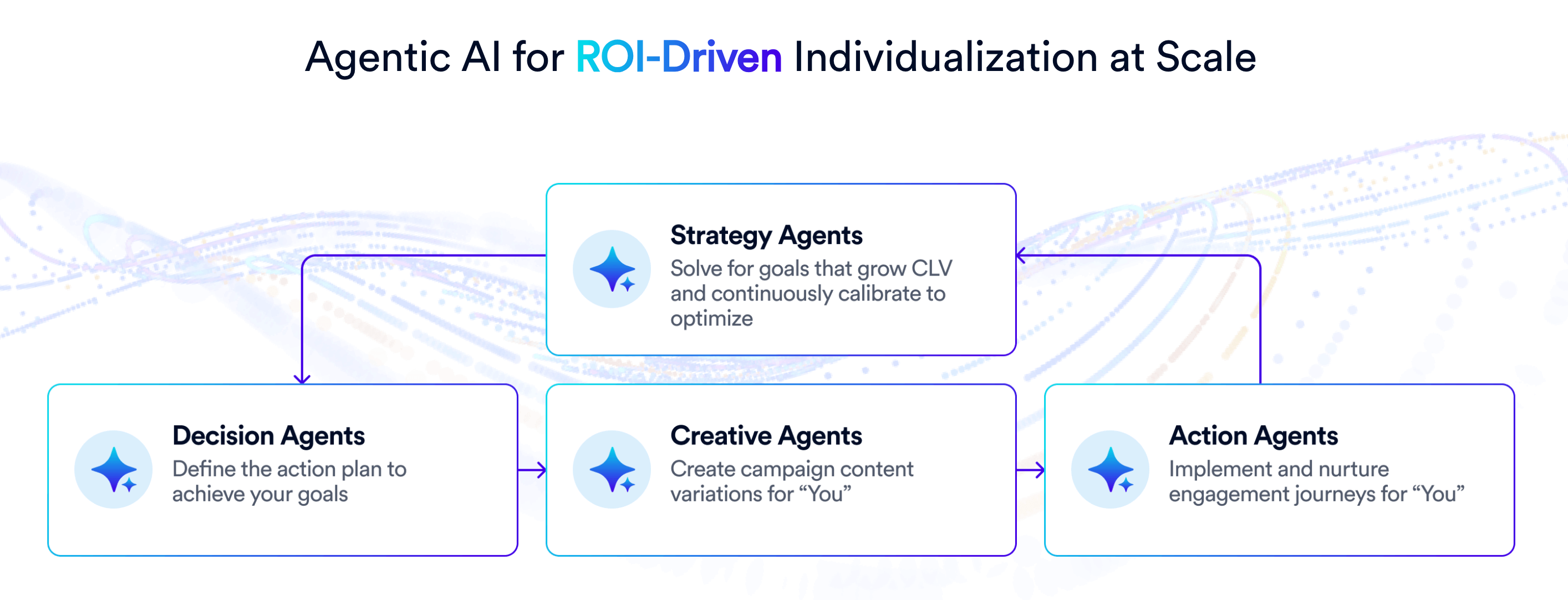
Strategy Agents: These are the planners. They analyze business goals and data to craft an action plan, for example, a customer retention or upsell strategy.
A Strategy Agent sets the overall campaign structure and coordinates the other agents. Over time, it learns which strategies succeed and remembers context, e.g., which segments responded best previously.
Decision Agents: These are the matchmakers. They decide what to offer to whom and when. By sifting through product catalogs and customer profiles, Decision Agents pick the most relevant product, message, or discount for each user segment.
For instance, using predictive scoring for conversion probability, they can identify which feature launch or promo code would resonate with a given user, tailoring the offer to maximize conversion.
Creative Agents: These handle content generation. They automatically produce on-brand marketing creatives and copy personalized to each user or segment.
For example, a Creative Agent can generate hundreds of email subject lines or ad headlines, each customized to different audience clusters, all following brand voice and style guidelines. By optimizing and testing these variations, the agents ensure every user sees the message most likely to engage them.
Action Agents: These are the doers. They execute the interactions across channels, such as push notifications, email, SMS, in-app messages, etc. Action Agents carry out each campaign step, sending messages or triggering workflows at the optimal moment.
They collaborate with human marketers, and the system is built so that marketers retain control over final approvals and guardrails. Over time, these agents also learn from feedback, opens, clicks, conversions, and self-tune timing and frequency.
All these agents run on CleverAI’s infrastructure, which plugs into your existing tech stack and maintains a continuous stream of data through the CleverTap Dataverse. This means real-time customer behavior, event streams, and feedback feed directly into the agents’ learning loop.
In practice, a marketer using CleverAI might simply set a goal, e.g., increase cross-sell by 15% this quarter, and CleverAI’s agents will autonomously plan, decide, create, and execute the relevant campaigns, all while the marketer monitors results on a dashboard and adjusts any rules if needed. The result is outcome-obsessed automation. The agents constantly optimize toward the defined KPIs, ensuring that every interaction contributes to higher ROI.
Want to see it in action? Schedule a call with CleverTap and discover CleverAI in its full potential.
Best Practices for Marketers Implementing Marketing AI Agents
Implementing agentic AI requires thoughtful planning. Below are key best practices:
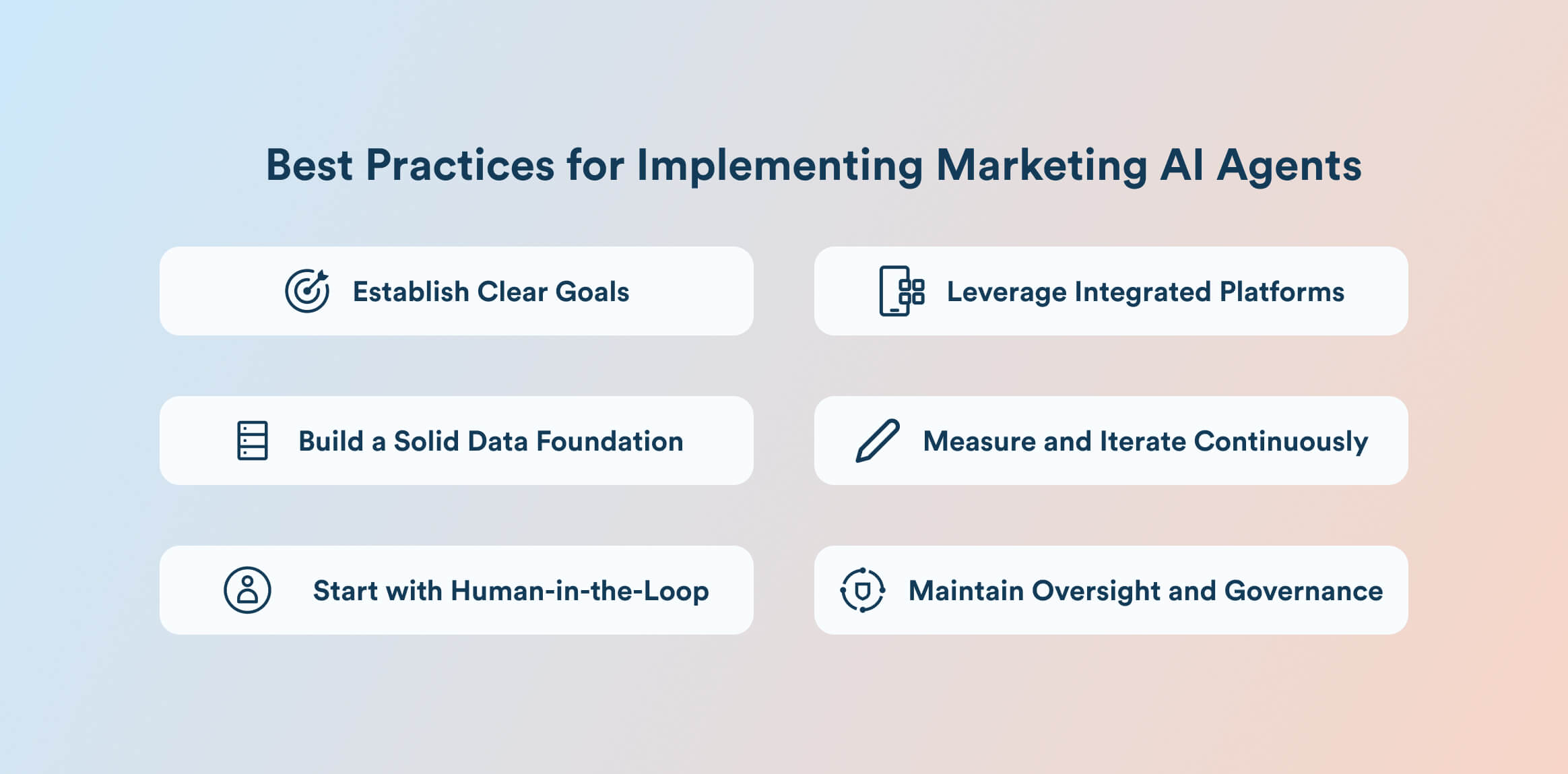
- Establish Clear Goals: Define specific objectives, e.g., boost onboarding conversions and reduce churn by 60% over the next quarter. Identify metrics before deploying agents. A focused use case helps guide the agent’s actions and makes ROI measurable.
- Build a Solid Data Foundation: Agents rely on rich data to personalize effectively. Ensure your customer data is accurate and unified. This is possible via clean CRM or CDP records, permissioned user data, and event streams. Invest in data integration and real-time pipelines so the agent always has up-to-date context.
- Start with Human-in-the-Loop: Begin by having team members review the agent’s plans and outputs. For example, let the agent draft campaign variants but mandate human approval on first runs. This step builds trust in the system and allows you to fine-tune any instructions. Require human sign-off on high-impact actions like major discounts or new campaign initiatives until you’re confident in the agent’s behavior.
- Leverage Integrated Platforms: Use a dedicated agentic AI platform, such as CleverTap’s CleverAI, that connects to your marketing ecosystem. Pre-built integrations with CDPs, ad networks, and messaging channels accelerate deployment and reduce engineering overhead.
- Measure and Iterate Continuously: Continuously monitor performance through key KPIs, such as ROI, engagement rates, conversion rates, and response times. Agents are designed to learn, so always feed outcome data back into the system. If an agent’s campaign underperforms, investigate and adjust its instructions or data inputs, then try again.
- Maintain Oversight and Governance: Review regular audits of agent decisions to ensure data and privacy compliance and ethical use. Update your guardrails as brand and privacy policies evolve. By combining AI autonomy with human judgment, you get to factor in accountability.
Start with a pilot, maybe one product line or channel, to gather learnings, then scale up. With clear objectives, clean data, and robust governance, AI agents will start delivering smarter campaigns and deeper personalization, transforming marketing productivity and results.
Turn Data Into Decisions with Agentic AI
Agentic AI is reshaping marketing by moving beyond static automation into systems that think, act, and optimize in real time.
But success requires more than adoption; it demands thoughtful governance, integration with existing stacks, and clarity on where human oversight adds value. As the ecosystem matures, businesses that embrace agentic AI now will gain a compounding advantage through faster decisions, smarter campaigns, and customer experiences that continuously evolve with intelligence.
Jacob Joseph 
Heads Data Science.Expert in AI, Data & Analytics and awarded 40 under 40 Data Scientists in India.
Free Customer Engagement Guides
Join our newsletter for actionable tips and proven strategies to grow your business and engage your customers.

